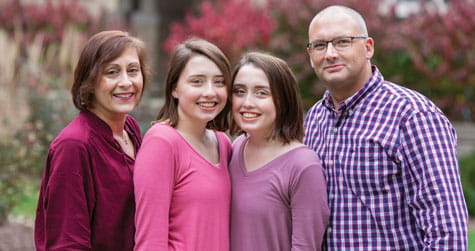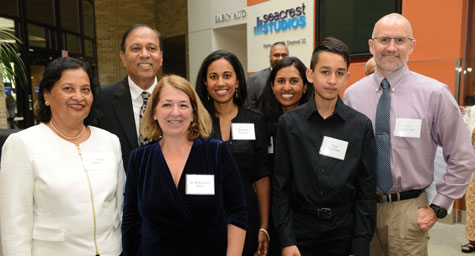Protecting Communities Near and Far
A universal flu vaccine will help vulnerable patients thrive
Eighteen-year-old twins Brenna and Claire are no strangers to Cincinnati Children’s. They made their way into the world 12 weeks too early, resulting in a variety of complications.
When Brenna was 2 years old, she needed surgery on her airway. Wanting the very best care for their daughter, her parents, Peter and Robin, did their research and decided to make the journey to Cincinnati Children’s from their home in Connecticut. And for the last 16 years, the family has counted on us to treat both girls’ complex medical conditions.
Brenna still battles significant respiratory issues. That’s why, every fall, like clockwork, she’s among the first to receive the flu shot. It’s not an option for her; it’s a necessity.
But the flu vaccine doesn’t always work.
Fighting a Deadly Enemy
Each year, hundreds of thousands around the world are hospitalized, and even die, because of the flu and secondary infections such as pneumonia. To help halt its spread, a vaccine is developed annually for the three or four strains of the virus that research indicates will be the most common that season.
But because flu viruses are constantly changing, it’s not a perfect science. For some, the vaccine allows them to not get sick at all; for others, it just lessens the severity of the symptoms.
But for those who are immunocompromised, like Brenna, getting the flu—even with the vaccine—is not just a few days feeling crummy in bed. It can be life or death.
“Brenna has been through a lot, and she knows her body,” says Robin. “So when she came down with the virus last year and told us she wasn’t getting better, we were scared.”
Investing in Innovation
Mary Allen Staat, MD, MPH, a lead investigator in our Division of Infectious Diseases, is dedicated to helping kids like Brenna stay healthy. She’s passionate about the development of a universal flu vaccine—one that will combat all strains of the flu.
“By preventing deadly diseases, we’re changing the world,” she explains, lighting up. “Vaccines mean healthier communities, not just here in Cincinnati, but across the country and around the world.”
But vaccine research and development can take years, and funding is limited. In order to move the needle toward the universal vaccine, philanthropic partners like Anuradha and Vinayak Kulkarni are critical.
They share Dr. Staat’s passion for making the world healthier by preventing infectious diseases. As physicians, they’ve spent years serving patients here in town and volunteering in clinics around the world, as well as in their home country of India.
That global perspective inspired the family to make a generous donation supporting Dr. Staat’s work. “The flu doesn’t recognize national boundaries, race, religions or cultures,” Vinayak shares. “A universal flu vaccine will help all of humanity.”
Cincinnati Children’s has a distinguished history in preventing infectious diseases. The oral polio and rotavirus vaccines were developed by our experts—impacting generations of kids all over the world. The Kulkarnis are confident that this is the best place for their investment.
Not a Moment Too Soon
Back in Connecticut, round after round of medication wasn’t helping Brenna’s symptoms. Since our doctors know her medical history best, the family made the decision to bring her to Cincinnati for additional treatment. During the journey, her condition worsened.
“Walking through the doors of the emergency department at Cincinnati Children’s, we all just exhaled,” Peter says. “We knew we were safe.”
But it would take some time to get Brenna out of the woods. She spent a week in our intensive care unit, as well as time in our pulmonary and complex airway units. To help her breathe and to clear the fluid out of her lungs, Brenna needed a procedure called a pulmonary lavage. When respiratory function is compromised, these types of treatments are critical.
Robin’s voice catches as she remembers. “We were rattled when a doctor told us this is how people die from the flu. They saved her life.”
Long-Term Legacy
Dr. Staat and the Kulkarnis’ are determined to save more lives. “We want our legacy to be sustaining,” Anuradha explains. “And that’s why we created an endowment for Dr. Staat’s work.” An endowed chair is one of the greatest honors for a scientist like Dr. Staat, and by creating one, the Kulkarnis’ gift will support our Division of Infectious Diseases in perpetuity.
“Because of the stable funding provided through the endowment, we’re able to build our team, attract the best researchers and invest in this program,” Dr. Staat explains. “It’s a long-term journey, and we are committed to the cause. I’m grateful that the Kulkarnis share our vision.”
Hope for the Future
For Brenna and her family, this past year was an eye-opening experience. “Because of our daughters’ medical histories, we enter each fall with caution,” Peter explains, “If there was a more effective vaccine, that would be one less stressor. It would be huge.”
Last winter, after nearly a month in the medical center, Brenna was released. The family went back to Connecticut and the twins finished their senior year. But Brenna wasn’t on campus with her friends during those last special days of high school. She had to spend the rest of the year at home because the flu was still rampant. “It’s too risky. You don’t know what people are carrying. If I get sick,” Brenna’s voice cracks, “it could mean another scary trip out here. And what if I’m not as lucky?”
Dr. Staat doesn’t plan to rely on luck. She continues to work tirelessly toward that universal vaccine.
Because of their experiences at Cincinnati Children’s, Brenna and Claire plan to study nursing. And if Dr. Staat and the Kulkarnis have their way, they’ll never need to treat a patient with the flu.





